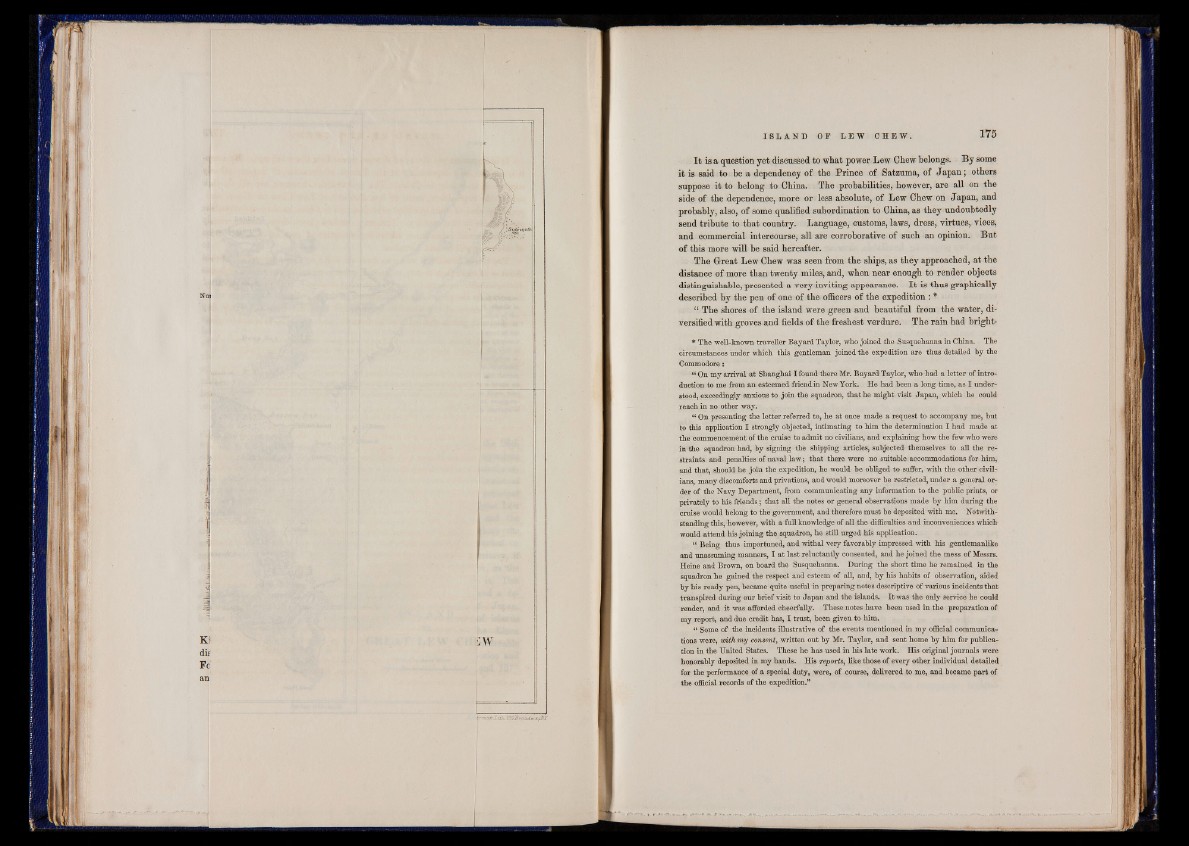
I t is a question yet discussed to what power Lew Chew belongs. By some
it is said to be a dependency of the Prince of Satzuma, of Japan; others
suppose it to belong to China. The probabilities, however, are all on the
side of the dependence, more or less absolute, of Lew Chew on Japan, and
probably, also, of some qualified subordination to China, as they undoubtedly
send tribute to that country. Language, customs, laws, dress, virtues, vices,
and commercial intercourse, all are corroborative of such an opinion. But
of this more will be said hereafter.
The Great Lew Chew was seen from the ships, as they approached, at the
distance of more than twenty miles, and, when near enough to render objects
distinguishable, presented a very inviting appearance. I t is thus graphically
described by the pen of one of the officers of the expedition : *
* The shores of the island were green and beautiful from the water, diversified
with groves and fields of the freshest verdure. The rain had bright-
* The well-known traveller Bayard Taylor, who joined the Susquehanna in China. The
circumstances under which this gentleman joined the expedition are thus detailed by the
Commodore:
“ On my arrival at Shanghai I found there Mr. Bayard Taylor, who had a letter of introduction
to me from an esteemed friend in New York. He had been a long time, as I understood,
exceedingly anxious to join the squadron, that he might visit Japan, which he could
reach in no other way.
“ On presenting the letter referred to, he at once made a request to accompany me, but
to this application I strongly objected, intimating to him the determination I had made at
the commencement of the cruise to admit no civilians, and explaining how the few who were
in the squadron had, by signing the shipping articles, subjected themselves to all the restraints
and penalties of naval law; that there were no suitable accommodations for him,
and that, should he join the expedition, he would be obliged to suffer, with the other civilians,
many discomforts and privations, and would moreover be restricted, under a general order
of the Navy Department, from communicating any information to the public prints, or
privately to his friends; that all the notes or general observations made by him during the
cruise would belong to the government, and therefore must be deposited with me. Notwithstanding
this, however, with a full knowledge of all the difficulties and inconveniences which
would attend his joining the squadron, he still urged his application.
“ Being thus importuned, and withal very favorably impressed with his gentlemanlike
and unassuming manners, I at last reluctantly consented, and he joined the mess of Messrs.
Heine and Brown, on board the Susquehanna. During the short time he remained in the
squadron he gained the respect and esteem of all, and, by his habits of observation, aided
by his ready pen, became quite useful in preparing notes descriptive of various incidents that
transpired during our brief visit to Japan and the islands. I t was the only service he could
render, and it was afforded cheerfully. These notes have been used in the preparation of
my report, and due credit has, I trust, been given to him.
“ Some of the incidents illustrative of the events mentioned in my official communications
were, with my consent, written out by Mr. Taylor, and sent home by him for publication
in the United States. These he has used in his late work. His original journals were
honorably deposited in my hands. His reports, like those of every other individual detailed
for the performance of a special duty, were, of course, delivered to me, and became part of
the official records of the expedition.”